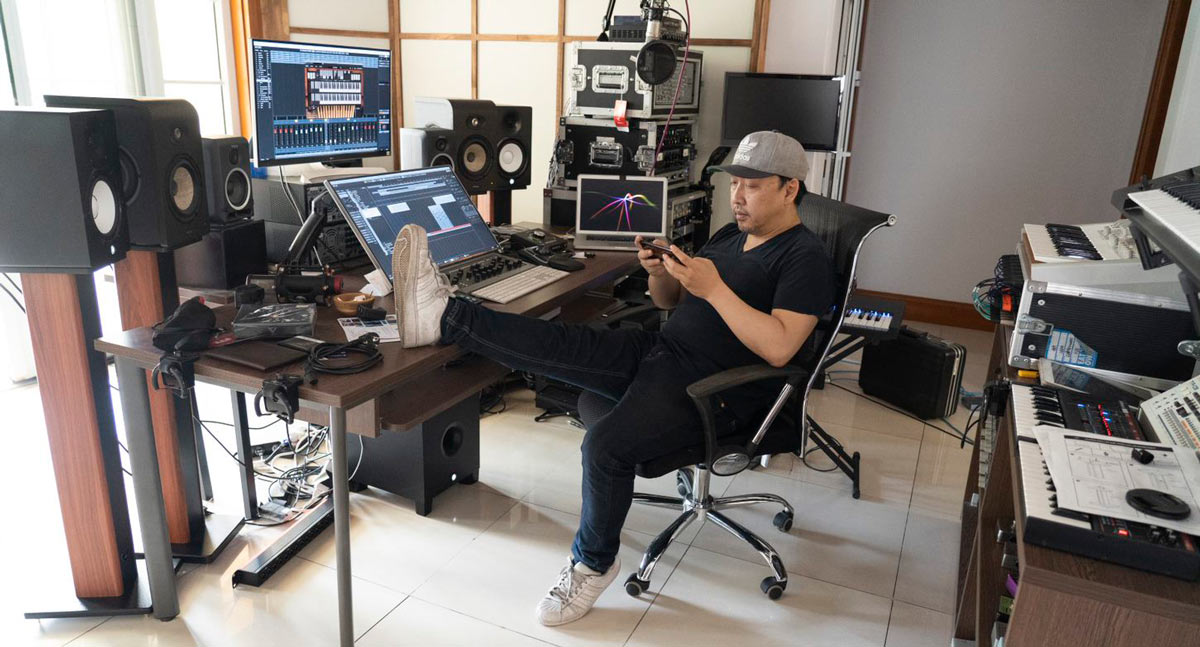Coffee Chats is a series where industry experts spill the beans on their profession, address misconceptions and impart practical tips.
Born in a South Korean diplomat’s family, Michael Choi has spent his life in many different parts of the world before beginning his music career in the UK.
Throughout this 27-year-long journey, Michael has held a handful of roles, from bassist to music producer and music director in London, United Kingdom and Los Angeles, California. He’s also scored collaborations with accomplished artists, namely MIKA, Annie Lennox, Gareth Gates, Zara Larsson, Shamir, Mr. Hudson, Beth Ditto and more.
In 2017, Michael came to Vietnam under an offer to become CEO of InQ International from Vietnamese-Australian artist Thanh Bui. Since then, he’s made it his goal to guide and grow local talents hopeful of making it to the international stage.
Michael believes the Vietnamese music scene is in no way saturated, and can still use more healthy competition among songwriters and artists. But he also thinks that the industry’s financial model has hit a ceiling where brand sponsorships are considered an artist’ livelihood. This is a significant hindrance to the growth of the industry in general, and yet we’re looking at a new generation of Vietnamese artists who are capable of attracting an international audience. In our interview, Vietcetera asks Michael to elaborate.
The music industry isn’t a democracy
Simply put, an accomplished musician is one who’s earned the loyalty of their audience through music.
I think household names in the world like Adele, Ed Sheeran, Taylor Swift… are true composers. They have a very devoted fanbase, and that’s probably because their music comes from a place of empathy.
An exceptional artist will be able to evoke the love of music in their audience by showing genuine emotions and musical maturity in their work. It creates a stronger bond than other reasons for idolization can, such as looks, choreography or social media presence.
This raises a point against K-pop and the likes. Rather than a “music industry'', K-pop is what I’d call “industrialized music”. As a Korean working in music, I don’t hold back when it comes to the dark side of K-pop, for I wouldn’t want my own niece to hypothetically be taken advantage of by this industry one day.

K-pop is a type of entertainment shaped by business people, so its culture is naturally primarily guided by factors concerning the “idols” rather than the music itself. Whatever we as the audience see, hear or experience within K-pop is the work of meticulous calculation, whether you look at it from a psychological, sociological or economic standpoint.
It makes sense for service providers like K-pop agencies to consider their audience’s input, living by the motto “the customer is always right”. But I have to disagree, because I don’t think that the music industry is a democracy. Instead, artists should be free to create music for themselves first and foremost, and in return, the audience should be free to decide whether they like it or not.
The tunes we adore by Trinh Cong Son, Prince or Paul McCartney… were brought to life by those artists’ musical personalities. If music isn’t at the core of the musicians, then what do you think is left?
Additionally, K-pop and the entertainment industry in general usually favors young talents. While they might be prettier and healthier, they’re also easier to manipulate. People usually tell them, “make the best of your youth before the industry lets you go”. But the sad reality is, every year, a lot of young idols have nothing when their career comes to an end. That’s why we see incidents of suicide or prostitution in the industry every now and then.
Yet, a singer typically doesn’t reach the peak of their vocal ability until around the age of 40; the same with their intellectual mind, too. Therefore, truly ambitious artists usually don’t sign up for K-pop, since they’re aware that their music will change with time, in line with their personal growth.
There is a power imbalance between artists and brands
For many reasons, Vietnamese artists have yet to be able to depend on music as their only income, which shifts a lot of economic power over to brands. This could partly be the reason behind a common lack of individuality in their music productions.
People will do what they have to do to make money, but what I’m hoping to find is a foothold for artists to live comfortably on their music by means of album sales, liveshow tickets and profits from streaming services. Only when artists and brands are equal can the former easily say no to unfitting deals from the latter.

In big markets, each genre of music could have a community of its own, allowing brands to identify which one their target audience falls into. In smaller markets like Vietnam, because there’s only so much money available, different artists — indie and commercialized, for example — have no choice but to fish from the same pond.
This is why it’s more sustainable to invest in the growth of artists, so that they know how to use music to build a real connection with their audience.
Next stop: the world
Across the globe, the main source of income for artists is liveshows. But in Vietnam, a lack of the right infrastructure means fewer of them. Even when held, these shows are usually for ceremonial purposes rather than for artists to make bread and butter.
Looking at the current landscape, I think branching abroad is sometimes actually the more feasible option for artists. The news of a Vietnamese artist officially promoting internationally would be nothing short of symbolic.
I particularly like to take the Vietnamese national football team as an example. They’ve inspired another great generation of football players with their accomplishments in the global arena, and “go big or go home” becomes the rule of thumb for local professional athletes.
The music industry is no different, so I’d love to see young artists with the same mindset in the future.
Watch MINH of InQ International, My Anh and Wren Evans lay the stepping stone for the next generation of Vietnamese artists. I think they are among the few in Vietnam who came into the global music scene with a serious plan and strategy.
In order to expand beyond the country’s borders, a fundamental requirement is English fluency — you need to be able to sing the way a native speaker would. Standard pronunciation really goes a long way in building rapport with the international community.
That’s only the beginning, though. In my opinion, an artist working intermarket also needs to have:
Composed a number of songs
The ability to sing live in 60 to 90 minutes
Stage presence
I’ve worked with successful international artists for many years. I would never say any of them are phenomenal. They’re just ordinary international artists who will always need to work harder, to sing and compose better, and to win over their audience with music. It is their musical ability that’s worth investing in, nothing else.

Only artists themselves can create change
At the end of the day, my job is just to assist artists’ growth. I’m well aware that I can’t change Vietnam’s music industry, which is why I focus on helping capable individuals bring about that change.
Besides artistic expertise, I teach my artists about launching, royalties, finance models, as well as ensuring fair contracts. I’ve seen a lot of exploitative contracts signed without the artists even realizing they were illegal.
In the near future, I also hope to build more venues for live performances. This will be the foundation for young artists’ development, while also warming the Vietnamese audience up to a new norm in music.
Translated by Jennifer Nguyen



